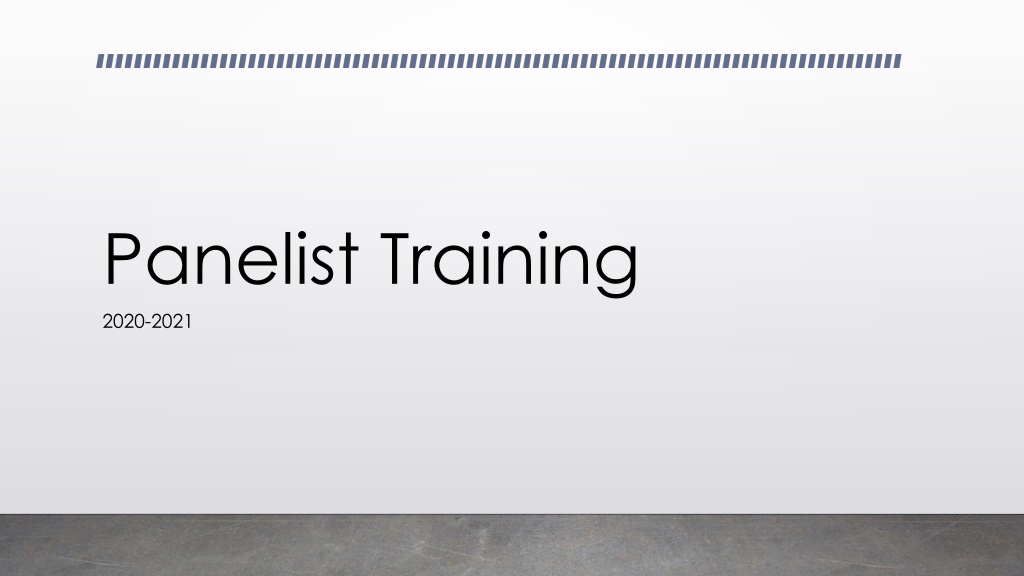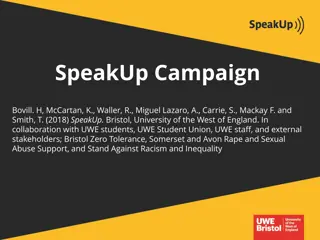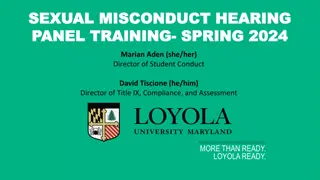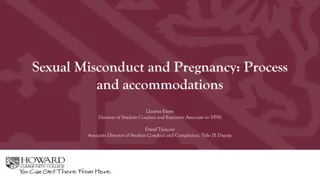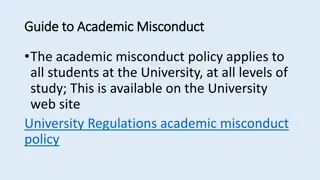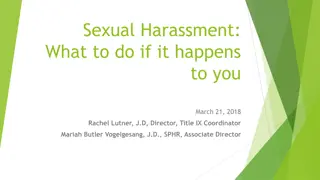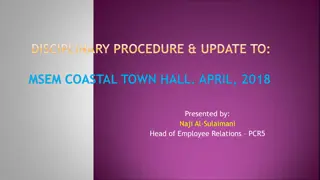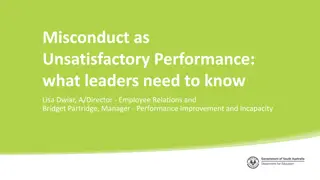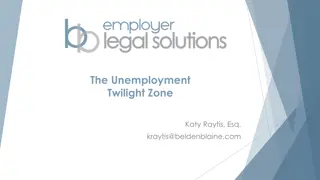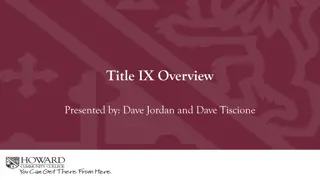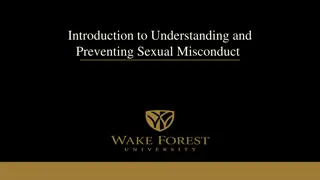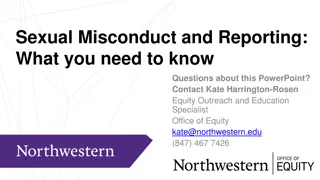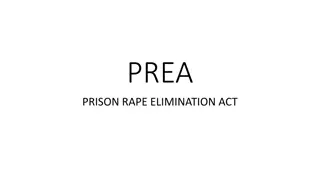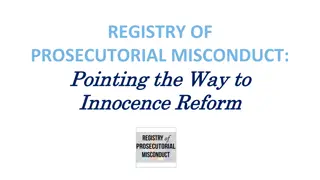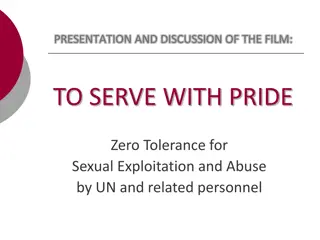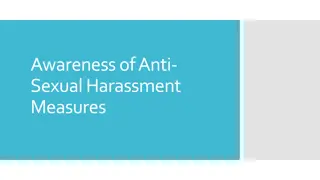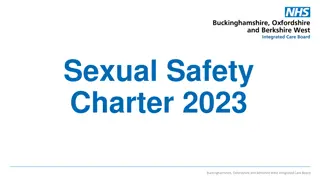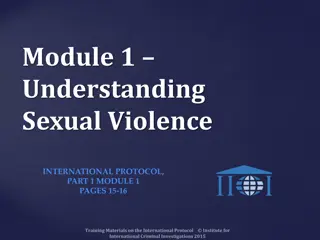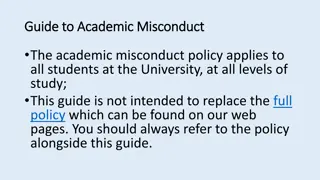Addressing Sexual Misconduct in Higher Education Policies
This content outlines the panelist training for the academic year 2020-2021 focusing on policies related to sexual harassment, assault, misconduct, domestic and dating violence, stalking, and retaliation. It emphasizes the prohibition of such behaviors, provides definitions of sexual assault, and highlights the importance of consent and live hearings in cases of sexual violence.
Download Presentation

Please find below an Image/Link to download the presentation.
The content on the website is provided AS IS for your information and personal use only. It may not be sold, licensed, or shared on other websites without obtaining consent from the author. Download presentation by click this link. If you encounter any issues during the download, it is possible that the publisher has removed the file from their server.
E N D
Presentation Transcript
Panelist Training 2020-2021
Scope of the policy and other relevant policies Sexual Harassment, Sexual Assault, Sexual Misconduct, Domestic Violence, Dating Violence, Stalking, and Retaliation are prohibited Policy applies to EVERYONE Process A and B Student Conduct Code Presumption of Non-Responsibility They are NOT guilty or innocent in a hearing
Laws and Regs 2020 Federal Regulations Requires LIVE Hearing Not in person 2016 Preventing Sexual Violence in Higher Education (IL)
Definitions Sexual Assault means sex offenses, including attempts, that are: 1) Forced These acts include: a. Forcible Rape: Penetration, no matter how slight, of the vagina or anus with any body part or object, or oral penetration by a sex organ of another person, without the consent of the Complainant.
Sexual Assault Continued b. Forcible Sodomy: Oral or anal sexual intercourse with another person, forcibly, and/or against that person s will (non-consensually), or not forcibly or against the person s will in instances in which the Complainant is incapable of giving consent because of age or because of temporary or permanent mental or physical incapacity. c. Sexual Assault with an Object: The use of an object or instrument to penetrate, however slightly, the genital or anal opening of the body of another person, forcibly, and/or against that person s will (non- consensually), or not forcibly or against the person s will in instances in which the Complainant is incapable of giving consent because of age or because of temporary or permanent mental or physical incapacity.
Sexual Assault Continued d. Forcible Fondling: The touching of the private body parts of another person (buttocks, groin, breasts), for the purpose of sexual gratification, forcibly, and/or against that person s will (non-consensually), or not forcibly or against the person s will in instances in which the Complainant is incapable of giving consent because of age or because of temporary or permanent mental or physical incapacity. 2) Lack of Consent: Any sexual act directed against another person, without the consent of the Complainant, including instances in which the Complainant is incapable of giving consent. See definition of consent.
Sexual Assault Continued 3) Non-forcible Incest: Non-forcible sexual intercourse, between persons who are related to each other, within the degrees wherein marriage is prohibited by Illinois law. Statutory Rape: Non-forcible sexual intercourse, with a person who is under the statutory age of consent of seventeen.
Consent Consistency Be consistent in how you define it Impartiality Be impartial, look at facts Policy How does the policy define it
Consent Policy Consent means a clear, affirmative, unambiguous and freely given agreement to engage in a specific sexual activity. Consent is demonstrated verbally or through actions that clearly indicate a willingness to engage in the specific sexual activity. Lack of verbal or physical resistance does not constitute consent. Consent to engage in sexual activity with one person does not constitute consent to engage in sexual activity with another person, and consent for a specific activity does not imply consent for any other activity. Use of alcohol, drugs, or other intoxicants does not diminish one s responsibility to obtain consent. Consent must be knowing and voluntary. To give consent, a person must be awake, of legal age, and have the capacity to reasonably understand the nature of his/her actions. Consent cannot be given by an individual who is mentally or physically incapacitated through the effect of drugs, alcohol or other intoxicants or for any other reason. Consent cannot be given when it is coerced, forced, or obtained by use of duress, fear, threats, or violence. Consent is not implied by the existence of a prior or current relationship or participation in prior sexual activity. A person s manner of dress does not constitute consent. Consent to engage in sexual activity may be withdrawn at any time and is automatically withdrawn by a person who is no longer capable of giving consent.
Incapacitation What does it look like Slurred speech Falling Blacking out Throwing Up Trouble walking Weird Behavior Both parties Did R give C alcohol
3 questions Force Could include threats, coercion Incapacitation Known or reasonably should have known Can victim make decisions based on their mental/physical state Blackouts Clear words or actions = Consent Silence = Not Consent, unless actions prove otherwise Can be withdrawn For every act At the time of the act
Definitions Continued Sexual Harassment (Educational) means conduct, on the basis of sex, that satisfies one or more of the following: a. Unwelcome conduct determined by a reasonable person to be so severe, pervasive, and objectively offensive that it effectively denies a person equal educational access to an SIUC program or activity. Whether conduct is unwelcome is subjective and determined by the Complainant except where the Complainant is under the age of consent. b. An employee of the University conditioning the provision of an aid, benefit, or service of the University on an individual s participation in unwelcome sexual conduct.
SPOO: If its SPOO Discriminatory Effect is a Given Severe Verbal (lower level) Touching, Force, Privacy Invasion, Violence/Threat of, Age, Explicit, Power Difference Pervasive Conduct or Effects of Conduct Totality, Facts specific, Frequency, Can C remove self, Damage, Openly practices, Denies access, Persistent, Changes terms/conditions AND Objectively Offensive Unwelcome, Reasonable Person, Similarly Situated, Community Standard, Don t be too narrow
Sexual Harassment Continued Sexual Harassment (Employment) means any unwelcome sexual advances, requests for sexual favors, and other verbal or physical conduct of a sexual nature when: a. Submission to such conduct is made either explicitly or implicitly a term or condition of an individual s employment (quid pro quo meaning this for that ); and/or b. Submission to or rejection of such conduct by the individual is used as the basis for employment decisions or assessments affecting such individual; and/or c. Such conduct has the purpose or effect of substantially interfering with an individual s work performance or creating an intimidating, hostile, or offensive working environment (hostile environment). Hostile environment harassment occurs when an employee is subjected to unwelcome sexually offensive conduct that is sufficiently severe or pervasive to alter their employment and creates an abusive or hostile work environment. To determine whether an environment is hostile or abusive, the university will look at the frequency of the conduct, the severity of the conduct, whether the conduct is physically threatening or humiliating, or a mere utterance, and whether it unreasonably interferes with an employee s work performance.
Definitions Continued Sexual Misconduct means any other act of a sexual nature which disrupts or negatively impacts the educational mission of the University, including but not limited to public displays of pornography; possession, creation, or distribution of child pornography; the exchange of money, goods or services in exchange for any sexual activity; causing another person to witness or observe any sexual act without clear, voluntary consent; videotaping, photographing or otherwise recording sex acts without the clear, voluntary consent of all individuals involved or sharing that video, photo, or recording with others without the knowing, voluntary, written, consent of the other party.
Definitions Continued Stalking means engaging in a course of conduct involving two or more independent actions, which threatens or endangers the health, safety, emotional welfare, or access to academic resources or employment of another person or which would cause a reasonable person to be fearful for his/her safety, health, or emotional well-being and which does cause another person to be fearful for his/her safety, health, or emotional well-being. For the purposes of this definition course of conduct means two or more acts in which the Respondent directly, indirectly, or through third parties, by any action, method, device, or means, follows, monitors, observes, surveils, threatens, or communicates to or about a person, or interferes with a person s property. Substantial emotional distress means significant mental suffering or anguish that may but does not necessarily require medical or other professional treatment or counseling.
Definitions Continued Dating Violence means violence, on the basis of sex, committed by a person, who is in or has been in a social relationship of a romantic or intimate nature with the Complainant. The existence of such a relationship shall be determined based on the Complainant s statement and with consideration of the length of the relationship, the type of relationship, and the frequency of interaction between the persons involved in the relationship. For the purposes of this definition dating violence includes, but is not limited to, sexual or physical abuse or the threat of such abuse. Dating violence does not include acts covered under the definition of domestic violence.
Definitions Continued Domestic Violence means any act of violence, on the basis of sex, committed by a current or former spouse or intimate partner of the Complainant, by a person with whom the Complainant shares a child in common, or by a person who is cohabitating with, or has cohabitated with, the Complainant as a spouse or intimate partner, or by a person similarly situated to a spouse of the Complainant under the domestic or family violence laws of Illinois or by any other person against an adult or youth Complainant who is protected from that person s acts under the domestic or family violence laws of Illinois. To categorize an incident as Domestic Violence, the relationship between the Respondent and the Complainant must be more than just two people living together as roommates
Definitions Continued Retaliation means any act of reprisal, including negative or otherwise unwarranted treatment, related to the reporting of or participation or decision not to participate in a complaint of a violation of this policy or any related policy or procedure. Retaliation may include, but is not limited to: 1. Taking negative tangible employment or educational actions against a person; 2. Taking actions that substantially interfere with or have a chilling effect on the employee's or student's ability to participate fully in and benefit from the work or educational environment; 3. Failing to provide assistance or instruction that would otherwise be provided; 4. Failing to fairly and/or objectively evaluate an employee's or student's performance; 5. Failing to record an appropriately earned grade for a student; or 6. Otherwise sabotaging an employee's or student's performance or evaluation.
Reporting safe.siu.edu Mandated Reporting No mandated complaint Official W/ Authority Confidential Advisor Other confidential sources
Process Complaint SAFE/Police Report/Complaint Assessment Jurisdiction Is it actually a possible violation Speak with Complainant Get info to write complaint (their story) Witnesses, Evidence They may decline to speak to us and get supportive measures They may speak to us, only want supportive measures If either of these, the R is not notified (usually)
Process Continued Complaint Signed by C (or TIXC) Investigation Speak to R Witnesses, Evidence Speak to Witnesses Evidence Ask for documentation Write statements Send to parties, witnesses to review
Process Continued Write Draft Report 30 days Send to Parties Electronic 10 business days Send back statements Write final report Send to TIXC to read Send to parties At least 10 more business days Hearing
Informal Resolution At any time in process, before a decision Both parties must agree, in writing Must have formal complaint first Negotiated Agreement to settle
Your Role Uphold Process Chair Panelists Maintain standards Be impartial Ask Questions Follow guidelines set by policy and procedure Don t have to agree with policy, but must uphold the policy
How to Conduct Questioning Who, what, when, where, why Relevant facts Corroboration Fill in any gaps you may have from the report Don t be Perry Mason! Be kind, patient, ask open ended questions
Questioning Continued If you have a gap, you can ask the investigator why it wasn t in report (maybe they didn t feel it was relevant, but you do) You may then have to ask one/both of the parties the question as well If it doesn t have anything to do with whether a violation occurred, it s not a good question Why did you get in the car? Not good Victim blaming Does it matter to whether or not X occurred Keep questions short People in hearings are frazzled and have short attention spans or may not be able to answer complex questions May have follow up questions
Questions Continued May want to ask clarifying questions too Be neutral and flexible LISTEN Carefully You can summarize their statements and ask if you are correct Don t act shocked! You will hear A LOT of stuff. Usually sexual, sometimes weird. Be prepared to look like they just told you their coffee order! Stay cool!
Pre Hearing Meetings May be asked for Either party Usually the Chair will do To answer questions Motions May want to ask if a question would be allowed Opportunity to discover if there are any issues, if there are any witnesses that do not need to be called (stipulated), go over Advisor guidelines
What you as a hearing officer should do before the hearing Read Complaint Read Policy Read Report More than once? Make sure you look at appendix! Make notes to ask questions Note who you should ask what Note what you want to know and why (Is it relevant?)
Hearing Live, not in person Chair Panel Script Parties Advisors Witnesses Investigators Police Officers Etc. Recorded
Hearing Panel Decides whether there is a violation or not Decides the sanctions in Process A Also process B if the respondent is a student Will send Notice of Outcome to TIXC What Policy was/was not violated Procedural Steps taken Findings of Facts Conclusions Sanctions Remedies TIXC will send to parties
Rights under Regs Right to present witnesses Right to Due Process Right to know evidence for/against Gather and present evidence Have an advisor Written notice Inspect and review evidence and final report Right to include directly related evidence to hearing, even if investigator left out of report Ask, through and advisor, relevant questions at hearing
Due Process Legal protections ensuring that no one will be deprived of education or employment without fairness in process Substantive Due process in decision Impartiality, fair, decision based on fact, etc. Procedural Due process in process Notice, consistency, allegations provided, etc.
Due Process Continued Notice Writing Opportunity to be Heard Information to Mount a Defense Present evidence/Witnesses Fair/Impartial Hearing Be Given All Evidence Have Advisor Now Cross
Advisors Must have for Hearing One will be appointed if party doesn t have one Cross Other roles may be limited Must follow guidelines Relevant Professional If they won t ask questions, we have to find someone who will They can choose anyone Attorney, mother, etc. Panel is authority over the Advisor, make them play by the rules
Cross-Examination Parties and Witnesses must submit themselves to Cross or their statements cannot be used No inferences can be made if someone doesn t submit Can t be in writing Submit no questions? Can admit evidence that wasn t a statement Video Relevance of questions are determined by Chair of Panel Ask Advisor why it s relevant May go to credibility If the question has already been asked (by panel) and answered, Chair can ask why they are being asked again and can deny it) Chair must explain their decision Irrelevant, unduly repetitious, or abusive MUST have Advisors for this Advisors can be reprimanded or removed from hearing is they don t follow the rules
Evidence (Including Testimony) Must be relevant No rules of evidence, other than relevance Does it help prove or disprove Don t have to agree with investigators Don t really ask investigators what they believe, that shouldn t be used in your decision
Evidence Continued Anyone who was interviewed during investigation must be at hearing in order for panel to use their statements for making determination Can be any type of evidence Credible/Reliable Don t get too caught up in irrelevant stuff (memory errors, etc) Trauma Brain Look at accuracy and reliability Things may not seem truthful, doesn t mean they aren t Plausible, Possible, can it be corroborated (especially by a witness with no dog in the fight), why would they lie, body language, pattern
Evidence Continued Some evidence is worth more Video (really good) Circumstantial (ok) Witness (depends on the witness) Documentation (really good) Medical (is it really relevant, only get some much info, privileged info must have permission to have or use) Avoid Character Evidence Impact Statements (unless sanctioning)
Relevance Must be evidence directly related to the possible violation, unless to prove a pattern Do not consider character of the parties Not relevant per regs Questions/Evidence about the Complainant s sexual predisposition or prior sexual behavior, unless such questions and evidence about the Complainant s prior sexual behavior are offered to prove that someone other than the Respondent committed the conduct alleged by the Complainant, or if the questions and evidence concern specific incidents of the Complainant s prior sexual behavior with respect to the Respondent and are offered to prove consent.
Deliberations ONLY decision makers No recordings Shred notes Look at policy Look at complaint Go through evidence Facts Vote Preponderance Violation? If yes, sanction Impact statements can be made by both parties Stop, prevent, remedy (protect C and Community)
Preponderance of the Evidence More likely true than not Presumption of Non-responsibility Presumption of Good Faith
Totality of the Circumstances Sex Based Mere utterance Reasonable person standard 1stamendment Humiliating, Threatening, Facts, What were the effects of the conduct SPOO (for students) See Page 13
Sanctions Depends on whether they are a student, faculty, or staff Student Conduct Code May look at past violations in sanctioning Collective Bargaining Agreement State Laws May include Suspension, Expulsion, Termination
Written Findings Policy violated Procedural steps taken Rational for finding Sanctions Remedies Appeal process Give to TIXC Send to parties at the simultaneously Final after appeal or date of appeal
Appeals Sanctions are stayed while the appeal is in process Grounds Procedural Irregularity New Evidence Conflict of Interest or Bias Sanctions are disproportionate Filing Writing to TIXC 7 business days from Notice of Outcomes Single Decision Maker
Appeals Continued Other parties, advisors, TIXC, investigators will be given the request for appeal Non-appealing Parties have 7 days to submit response to TIXC Appeal Chair receives If it doesn t fit a ground of appeal, it s thrown out If it does Appeal Chair will look at it and either Affirm Modify Remand
Implicit Bias http://kirwaninstitute.osu.edu/research/understanding-implicit- bias/ Implicit bias: attitudes or stereotypes that affect our understanding, actions, and decisions in an unconscious manner. activated involuntarily and without an individual s awareness or intentional control feelings and attitudes about other people based on characteristics such as race, ethnicity, age, and appearance develop over the course of a lifetime beginning at a very early age through exposure to direct and indirect messages
Disparate Treatment and Impact Disparate treatment occurs where members of a protected class have been treated differently than others (purposely) Disparate Impact occurs when a certain practice makes it more difficult for a member of a certain protected class (unintentionally)
